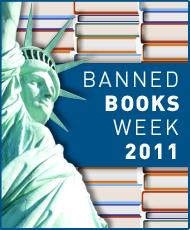
Throughout history, those in power have attempted to control access to information, to maintain — in the words of Thomas Jefferson — "tyranny over the mind of man." While it used to be books alone smoking in the pyres, today virtual information is equally vulnerable to censorship — if not more so — since all it takes is the click of a web filter to block a website.
On the eve of , we remember and celebrate Franks v. Metropolitan Board of Public Education, a case that opened access to inappropriately-blocked websites in hundreds of schools, sparking the ACLU's national .
In 2009, high school senior Andrew Emitt sat down at a computer in his Tennessee school to search for scholarships for LGBT (lesbian, gay, bisexual, transgender) students. He tried . A message appeared stating that the filtering software his school used blocked the website. He tried . Blocked. He tried . Blocked. Meanwhile, in another Tennessee school, librarian Karyn Storts-Brinks was trying to help her students conduct research and running into the same problem. After trying unsuccessfully to get the problem fixed on their own, both Andrew and Karyn contacted the ACLU of Tennessee independently.
We found that while the filters censored pro-LGBT sites, they allowed sites that urged LGBT folks to change their sexual orientation through so-called "reparative therapy" or "ex-gay" ministries — a practice denounced as dangerous and harmful by such groups as the American Psychological Association and the American Medical Association.
Allowing access to websites that present one side of an issue while blocking sites that present the other side is called viewpoint discrimination, and it's illegal.
It turned out that eighty percent of Tennessee public schools used filtering software that blocked sites categorized as "LGBT." While Tennessee law requires that schools use Internet filtering software, that law is meant to protect students from information that is obscene or harmful to minors — material that was already blocked by a different filter and was not part of the "LGBT" category.
The discriminatory censorship in this case not only hurt students by making it impossible to access important material about scholarships, research for school-related assignments, and Gay-Straight Alliance club information. Students also need to be able to access information about their legal rights or what to do if they're being harassed at school, especially given the high rate of bullying and suicides among gay teens.
On May 19, 2009 ACLU-TN and in federal court against Metropolitan Nashville Public Schools and Knox County Schools on behalf of three students and Storts-Brinks, who was also the advisor of the school's GSA.
On June 3, Knox County Schools Superintendent Jim McIntyre released a statement saying that their . This change went into effect in all Tennessee and Indiana schools that used the same software. On July 30, 2009 we entered into a settlement agreement with the schools that ensured they would not filter this information in the future.
Unfortunately the problem of web censorship still takes place in other school systems. The American Civil Liberties Union's LGBT Project is asking public high school students throughout the U.S. to check out your high school's web filters and help us make sure you're not being blocked from information that you have a right to have.
If YOUR school is blocking LGBT-friendly websites, . Maybe together we can get rid of the need for a Banned Websites Awareness Day in the future.
Learn more about censorship: Sign up for breaking news alerts, , and .


